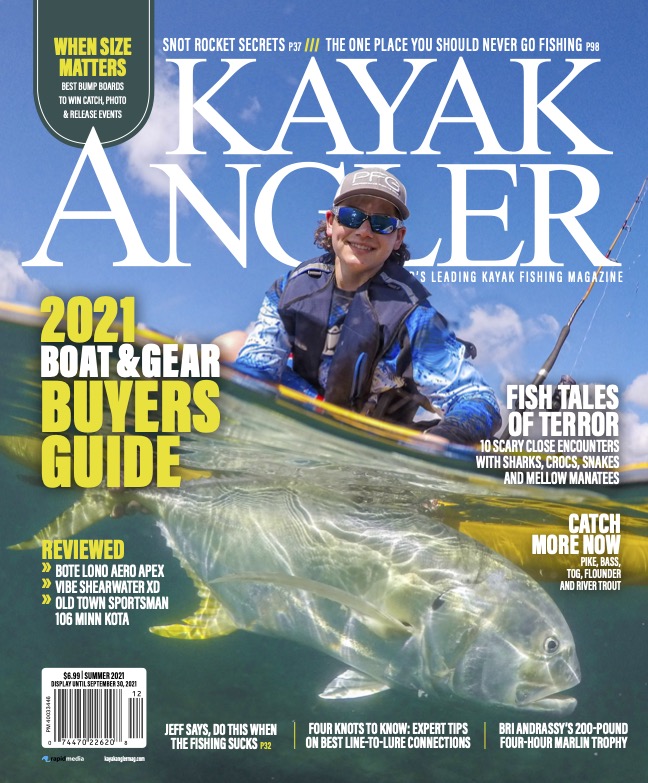Getting skunked sucks. Go fishing; no fish. When I started out kayak fishing, there would be long days of waving a rod over my head and nothing happening on the wet end of the line. Go home, feel shame, confusion and disgust after not catching any fish at all. It happens to us all. And nobody likes losing.
Not Catching Fish is a Real-Life Drag
Being a fishing idiot stinks. Where I live, we get real winter, and when the ice breaks, the weather warms and spring brook trout opens, I load the truck with giddy excitement.
This year I made the long drive to my special backcountry brook trout pool, backpacked in my inflatable kayak and pumped it up while fighting off malicious blackflies. I pushed through the nasty willow brush, overloading my allergies, and plopped my fly line into the water to get it out of the way as I crawled into my kayak.
Instantly, a brook trout hit the fly and my scramble to grab my rod and set the hook resulted in the missed set and irretrievably flinging my fly into the willows. Even worse, the moment of chaos set me off balance, flipping the small blow-up boat and dumping me in icy river water.
When there is a gap between what we believe and what we do, this inconsistency causes actual physical stress. The stress becomes a motivating force because we are compelled to eliminate that stress by either changing what we think or changing what we do.
The fishing trip was over before it began. Deflated, I let the air out of the kayak, hiked out and drove home still soaking wet and feeling like an idiot. We’ve all shared this experience. No one likes it.

Getting Skunked Causes Cognitive Dissonance
Not only does not catching fish suck, it is painful. Psychologists have measured these types of scenarios as physically uncomfortable. The experts say losing on the water causes physiological stress.
In 1957, psychologist Leon Festinger published his theory of cognitive dissonance, which has become one of the staple theories for explaining human motivation and behavior.
The theory is based on the assumption that humans seek a consistent view of the world. This assumption underlies a whole bunch of motivation theories. We use the idea to explain things like personality and identity. Cognitive dissonance applies to situations where what we believe and what we do don’t line up.
When there is a gap between what we believe and what we do, this inconsistency causes actual physical stress. The stress becomes a motivating force because we are compelled to eliminate that stress by either changing what we think or changing what we do. Voila, alignment between thoughts and actions, and consistency again.
I think I am a decent fly angler. I go out intending to catch fish, which has become a substantial part of my identity. Getting skunked is inconsistent with my view of the world, yet my belief in my angling ability is not proven through my actions. Can I be a fisherman if I’m not catching fish?
Looking Around for External Causes
When things don’t work out, it challenges who I believe I am. Ouch. I’ve kayaked my whole adult life, and I have substantial objective proof I am good at it. But a full-body dunk in ice cold water says otherwise. So, what do I do?
Doctor Festinger argued we have three options: change what we believe, change what we do, or rationalize. I still think I am a decent angler, even on bad days. I still think I can kayak, even after dunking.

I ease my cognitive dissonance and physical stress by making excuses. It is that easy. When I don’t catch fish, I blame the barometric pressure and moon cycle. Flipping my kayak is the kayak’s fault. Just as easily, I could pin the bad days on my lack of ability.
Rationalizing is a fancy word for an excuse, but an excuse is only a short-term solution. The barometer and moon can’t work against me every time I go fishing. At some point I need to produce a fish.
Eventually, getting skunked 99 percent of the time will require a revision of my belief in my abilities. Cognitive dissonance allows for temporary inconsistency, but ultimately beliefs and actions need to align, no matter how many excuses I come up with.
If belief and reality do not align, science says I will feel the inconsistency in my body. I could face elevated blood pressure, muscle tension and more physical manifestations of the psychological dilemma.
Anglers Persist When They’re Not Catching Fish
Kayak angling is a wonderful exercise in humility. My actions speak louder than my beliefs. The fish does not care what I think of myself. If I can consistently entice a fish to take my fly, the proof allows me to build a consistent picture of my abilities.
I brag to my friends of my success or downplay my failures, but internally the measure is in our actions. When things go wrong, a physical stress response will follow. Fishing can be humbling. Luckily, it can also be exhilarating. And, one or two bad trips are usually followed by success.
Still, losing tackle is disappointing and falling in is humiliating. But these bumps in the road can be painless if I don’t take myself seriously. I just laugh it off and revise my understanding of my abilities. I just say to myself, “I love kayak fishing, but sometimes I am an idiot.”

We have three options when we’re not catching fish: change what we believe, change what we do, or rationalize. | Feature photo: Creative Workshop/Pexels






